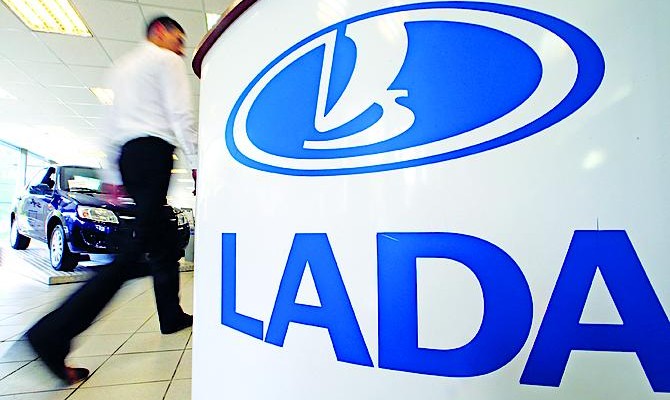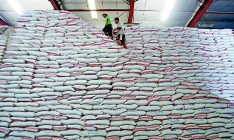Economy
Car marketUkraine investigates imports of Russian cars

Ukrainian car manufacturers have convinced the government that the supply of passenger cars from Russia has a negative impact on the industry. The Interdepartmental Commission on International Trade (ICIT) at the Ministry of Economic Development initiated an anti-subsidiary investigation into imports of cars made in the Russian Federation, according to the ICIT’s report in yesterday’s Uryadoviy Kuryer newspaper. Such a decision was made on the basis of complaints from the Ukravtoprom Association of Automobile Manufacturers acting on behalf of the ZAZ and Bohdan Motors companies.
Content of claims
The Ukravtoprom Association, which filed the complaint against Russian automobile import with the ICIT, considered that manufacturers of passenger cars in Russia enjoy special state subsidies and preferences in production, sale, processing and export of vehicles. As an example, the association mentioned such Russian state programs as the Automobile Industry and the Development of Industry and the Enhancement of its Competitiveness.
In addition, the Russian government insures car exporters from business and political risks and provides state warranty support for automobile export. The association also refers to the fact that Russian legislation includes mechanisms of recovery of interest rates on loans issued to Russian producers and coupon yield on bonds issued by them.
Russia had first place on the list of foreign suppliers of cars in Ukraine. In 2012, Ukraine imported 37,500 cars from Russia to the amount of US $333.6 mn, 22,200 vehicles amounting to US $221.3 mn in 2013, according to the State Statistics Service. During 6 months of this year supplies of cars from Russia dropped to 2,700 units to the value of US $27.09 mn and during the same period Russia fell to the third place in the ranking of automotive suppliers in Ukraine, giving way to Japan and Germany.
To each his own
Russia openly subsidizes its industries, while Ukraine’s businesses are operating in non-competitive conditions, so the launch of the investigation is quite objective, stated CEO of ZAZ Mykola Yevdokymenko. He added there were 22 car plants in Russia, 10 of which exported their products to Ukraine. Yevdokymenko hopes that the investigation will prove the influence of Russian imports and measures will be introduced for tariff regulation of the supply of cars from that country. “We hope that restriction of imports of cars from Russia will have a positive impact on the development of domestic production and improve marketing of Ukrainian products,” said Yevdokymenko.
Yet, the investigation poses a threat to only one car manufacturer in Russia – AvtoVAZ. Until recently, except for AvtoVAZ’ products Ukraine imported some models of Renault, Kia, Hyundai and Volkswagen cars, and a number of other brands, says CEO of the All-Ukrainian Association of Automobile Importers and Dealers (VAAID) Oleh Nazarenko. He says Ukrainian carmakers have been pushing for an anti-subsidiary investigation since last year. Similar attempts have also been taken in early spring. Against this background, says Nazarenko, the VAAID held talks with automobile importers and recommended getting involved in supplies of cars from other markets instead of Russian. Nazarenko says in anticipation of the beginning of the ICIT’s investigation importers reported that its results would not affect their work and cars were already supplied from other markets. Moreover, according to Nazarenko, Ukrainian manufacturers tried to launch an anti-subsidiary investigation in respect of other importing countries, but could not find any convincing arguments to file the complaints to the ICIT.
Today, the condition of the Ukrainian carmaking industry leaves much to be desired. Three of the four major enterprises in the country (ZAZ, Bohdan and the Kremenchuk Car Assembly Plant) virtually produce no cars and Eurocar makes only several hundred vehicles per month. For example, only 189 cars were made in Ukraine in August, which is 28 times less than in the same month in 2013.
Disbelief in effect
Market players say that even if the manufacturer’s claim was satisfied, it would not necessarily guarantee achievement of effect desired by Ukrainian producers. General Director of UkravtoVAZ (importer of AvtoVAZ) Ihor Voznyuk says that if restrictions against Russian cars are introduced, the Lada brand will no longer be sold in Ukraine. He also says that currently the Ukrainian market is so small that the withdrawal of AvtoVAZ products from the market will not save the domestic car industry: “In order to break even, a plant making 120,000 vehicles has to sell at least 4,000 – 6,000 cars every month, not 150 – 160 vehicles, as we do today”, although in the past VAZ had a leading position on the Ukrainian market. In 2011 these products had more than 13% of the market and the average monthly sales were 2,400, while its closest rivals – Hyundai and ZAZ – had 10.3% and 9.2%, respectively (data from AUTO-Consulting). In 2012 AvtoVAZ still remained one of the top three leaders with a share of 8%, which in 2013 was reduced to approximately 4%.
Other market players believe that the AvtoVAZ’ niche is most likely to be filled not by Ukrainian, but by low-cost Chinese cars. Nazarenko believes that the issue of restrictions on imports from Russia is rather political and against the background of the apparent reconciliation between the two countries we should hardly expect any progress in the ICIT’s investigation.
No need to hope
Independent lawyers also do not believe in success of the investigation. Head of the International Trade Practice at the Sayenko Kharenko Law Firm Natalya Mykolska says the anti-subsidiary investigation is one of the most complicated procedures in the World Trade Organization (WTO), to which countries resort quite infrequently and Ukraine has never done it before. Head of International Trade and Customs Law Practice at the Yehorov, Puhinskiy, Afanasiev & Partners Law Office Hlib Byaliy agrees with her adding that against the background of the global economic crisis and contraction of the domestic car market it will be extremely difficult to prove the cause-and-effect relationship in the part of direct influence of Russian subsidies on damages to Ukrainian producers.
He says, theoretically, in 60 days it will be possible to introduce provisional duties against imports of Russian cars to Ukraine, but if the results of the investigation do not prove the affect of Russian subsidies, Ukrainian would have to return the amount paid by the importers. So, it is unlikely that in today's situation Ukraine will take such a step, moreover, temporary measures are not practiced worldwide, says the lawyer. The Ministry of Economic Development confirms such a point of view. Acting Minister Anatoliy Maksyuta said in a conversation with Capital that for the time being there are no plans of imposing restrictions.






 of the agreement of syndication with Financial Times Limited are strictly prohibited. Use of materials which refers to France-Presse, Reuters, Interfax-Ukraine, Ukrainian News, UNIAN agencies is strictly prohibited. Materials marked
of the agreement of syndication with Financial Times Limited are strictly prohibited. Use of materials which refers to France-Presse, Reuters, Interfax-Ukraine, Ukrainian News, UNIAN agencies is strictly prohibited. Materials marked  are published as advertisements.
are published as advertisements.